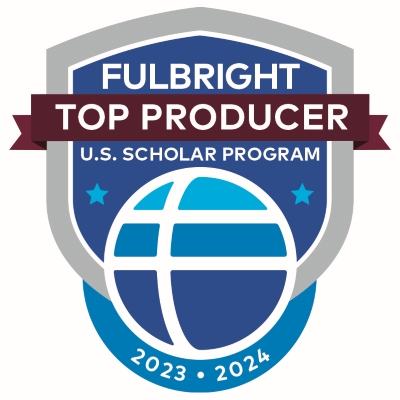UMB Named Fulbright Top Producing Institution
February 14, 2024 Lorri Angelloz
Universities that receive this honor have the highest number of faculty and administrators selected for the Fulbright U.S. Scholar Program, which provides funding for international opportunities.
The U.S. Department of State’s Bureau of Educational and Cultural Affairs has recognized the University of Maryland, Baltimore (UMB) for being a Fulbright Top Producing Institution for 2023-2024. Colleges and universities that receive this honor have the highest number of faculty and administrators selected for the Fulbright U.S. Scholar Program, which provides funding for international opportunities. UMB was cited in the Special Four-Year Institution category, along with 10 other colleges and universities.
The Fulbright Program is the U.S. government's flagship international academic exchange program. Two scholars from UMB were selected for Fulbright awards for academic year 2023-24. Among them is Martha Ertman, JD, professor at the University of Maryland Francis King Carey School of Law. Ertman has been awarded a Fulbright Canada Traditional Scholar Award for the spring 2024 semester.
Deeply affected by the racial injustice that rose in awareness during the COVID-19 pandemic, she developed her Fulbright project around a resolution to focus her work in contracts and commercial law to address this issue. Ertman’s work on contract-based reparations for racial injustice has taken her to McGill University in Montreal to teach and conduct research.
In recent years, Ertman has worked to develop a contract-based way to approach the idea of reparations for past racial injustice, reasoning that since contracts have been historically discriminatory, they can be designed to right past and current wrongs. Her theoretical work at McGill involves how racial wealth disparities breach the social contract, and she has cited Canada’s Truth and Reconciliation Commission (TRC)’s summary report “94 Calls to Action” as an important source in her research. The TRC was formed in 2008 as part of Canada’s Indian Residential Schools Settlement Agreement, and the commission's findings and recommendations focus on redressing the harm resulting from the schools.
“I wanted to study reparations in Canada as a remedy for breach of the social contract because Canada's made more progress than the U.S. regarding reparations for mass harms to Indigenous groups, especially regarding state-sponsored residential boarding schools,” Ertman said. “Since my grant began in January 2024, McGill University and Montreal have provided many parallels between Canadian and U.S. racial harms and reparations for them. Here, fellow Fulbright Rashida Braggs and I are attending a Black History Month lecture by Dr. Melanie Newton on Afro-Indigenous reparations in the Caribbean, which provided framework for understanding overlapping histories and claims of both Indigenous peoples and those of the African diaspora. Discussions with Canadian law faculty likewise show how Canada's legal education incorporates Indigenous law and anti-racism into its curriculum in ways that would enrich U.S. law schools.”